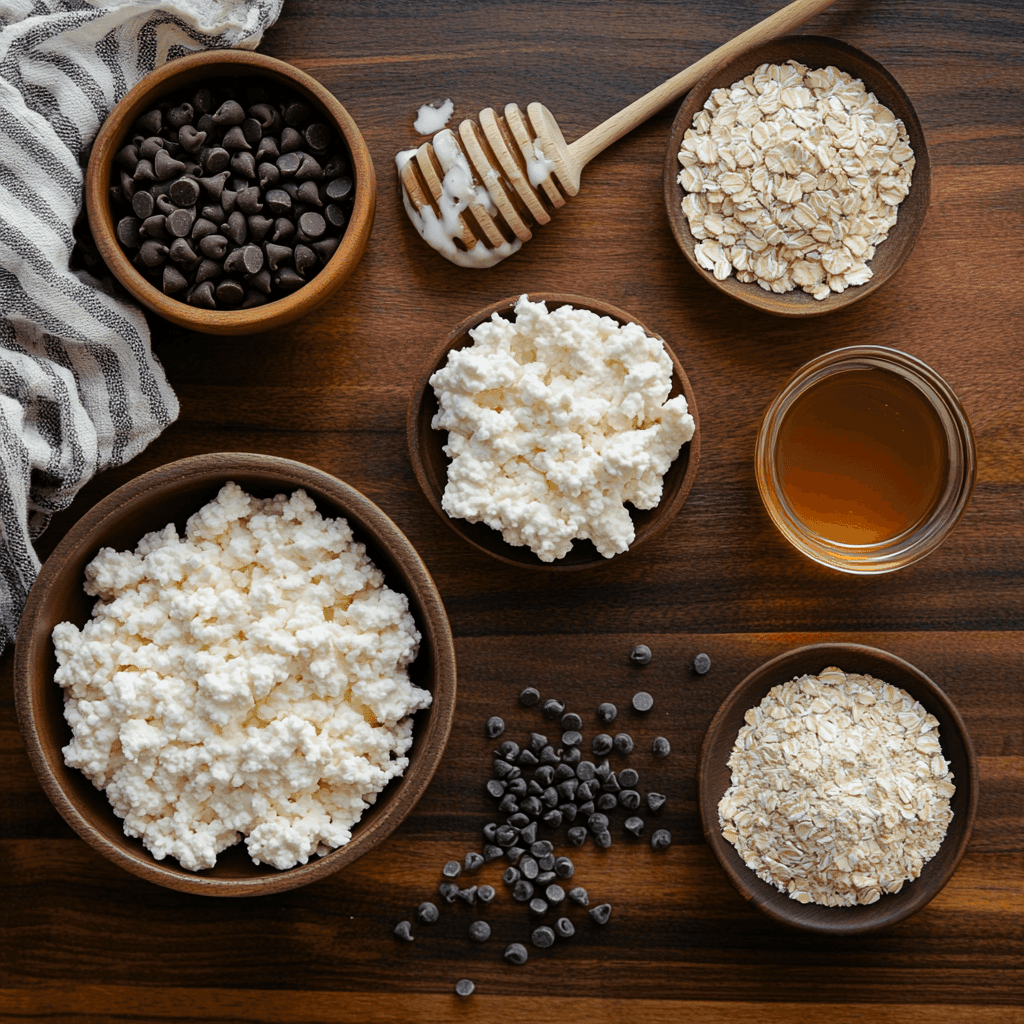Imagine a healthy cookie recipe that’s both tasty and good for you. Cottage Cheese Cookie Dough is a game-changer, offering a protein-rich treat from simple ingredients. Check out the recipe at Cottage Cheese Cookie Dough for a great start.
Cottage Cheese Cookie Dough is perfect for health enthusiasts and food lovers. It’s full of protein and low in calories. In this article, we’ll explore the world of Healthy cookie recipe and the benefits of Cottage Cheese Cookie Dough.
Table of contents
- Key Takeaways
- Understanding Cottage Cheese Cookie Dough
- Essential Ingredients for Your Protein-Rich Dessert
- Ingredients Needed
- Kitchen Tools and Equipment Needed
- Step-by-Step Preparation Method
- Mastering the Perfect Cottage Cheese Cookie Dough Texture
- Flavor Variations and Mix-in Options
- Storage Tips and Shelf Life
- Common Mistakes to Avoid
- Health-Conscious Substitutions and Alternatives
- Conclusion: Enjoying Your Homemade Healthy Treat
- FAQ
- What is cottage cheese cookie dough and how is it different from traditional cookie dough?
- What are the health benefits of cottage cheese cookie dough?
- What are the essential ingredients needed to make cottage cheese cookie dough?
- What kitchen tools and equipment are required to make cottage cheese cookie dough?
- How do I make cottage cheese cookie dough step-by-step?
- What is the secret to achieving the perfect cottage cheese cookie dough texture?
- Can I customize the flavors of cottage cheese cookie dough?
- How should I store cottage cheese cookie dough, and how long does it last?
- What are some common mistakes to avoid when making cottage cheese cookie dough?
- Are there any health-conscious substitutions or alternatives I can use for cottage cheese cookie dough?
Key Takeaways
- High protein content in Cottage Cheese Cookie Dough makes it an excellent choice for health enthusiasts
- Cottage Cheese Cookie Dough can be made with simple ingredients, including cottage cheese, maple syrup, and almond flour
- This Healthy cookie recipe is versatile and can be enjoyed as a snack, dessert, or post-workout fuel
- Cottage Cheese Cookie Dough is low in calories and rich in protein, making it suitable for weight management efforts
- Proper storage in an airtight container can help maintain moisture in refrigerated cookie dough
- Cottage Cheese Cookie Dough can be customized with various mix-ins and flavor combinations to suit your taste preferences
Understanding Cottage Cheese Cookie Dough
Cottage cheese cookie dough is a tasty and healthy alternative to regular cookie dough. It’s low in carbs and high in protein, making it perfect for those who want a guilt-free snack. This treat is both delicious and nutritious, thanks to cottage cheese.
This cookie dough is packed with 11 grams of protein per serving. It’s quick to make, ready in just 10 minutes. You’ll need 1 cup cottage cheese, 1/4 cup maple syrup, and 1 scoop vanilla whey protein powder.
What Makes It Different from Traditional Cookie Dough
The main difference is cottage cheese, which gives it a unique taste and texture. It’s also lower in carbs and higher in protein than regular cookie dough. This makes it a hit for those on a low-carb diet.
Health Benefits and Nutritional Profile
Cottage cheese cookie dough is great for muscle growth and repair thanks to its high protein. It’s also good for those with diabetes or trying to control blood sugar. Each serving has 267 kcal, 19 grams of carbs, and 17 grams of fat.
Why Choose This Alternative
Choosing cottage cheese cookie dough is a smart move for a healthier treat. It’s tasty, nutritious, and fits well into a low-carb diet. You can indulge in this dessert without feeling guilty, making it a fantastic protein-rich option.
Essential Ingredients for Your Protein-Rich Dessert

To make a tasty cottage cheese dessert, you’ll need a few key ingredients. You’ll need cottage cheese, almond flour, and a sweetener like maple syrup. Cottage cheese adds protein, helping you feel full.
Choosing the right flour is important when making cookie dough without eggs. Mix oat flour with almond flour for better nutrition. Adding mini chocolate chips helps spread the chocolate flavor and reduces the need for sweetener.
Here are some key ingredients to include in your recipe:
- 2 cups of cottage cheese (low-fat or 2% for a better balance of creaminess and lower saturated fat)
- 1/2 cup of vanilla protein powder (such as Naked Whey)
- 1/4 cup of maple syrup
- 1/2 cup of almond flour
- Mini chocolate chips
Use high-quality ingredients and adjust your cookie dough to your liking. With these ingredients, you can make a protein-rich dessert that’s both tasty and healthier than regular cookie dough.
Ingredients Needed
| Ingredient | Quantity | Nutritional Value |
|---|---|---|
| Cottage Cheese | 2 cups | Approx. 22g protein, 90 calories per 100g |
| Vanilla Protein Powder | 1/2 cup | Approx. 25g protein, 120 calories per scoop |
| Maple Syrup | 1/4 cup | Approx. 52g sugar, 170 calories per 1/4 cup |
Kitchen Tools and Equipment Needed
To make a high-protein dessert like cottage cheese cookie dough, you need basic kitchen tools. You’ll need a blender, a mixing bowl, and a spoon. The right tools make preparing your dessert easier and faster. Check out Rafel Recipes for recipes and tips to start.
For a high-protein dessert, the right equipment is key. Optional tools like a stand mixer, silicone spatula, and measuring cups can improve your dessert. They help you mix and measure ingredients better, making your dessert taste great.
Basic Kitchen Essentials
- Blender
- Mixing bowl
- Spoon
Optional Tools for Enhanced Results
- Stand mixer
- Silicone spatula
- Measuring cups
With these tools, you’re ready to make a tasty and healthy high-protein dessert. Always follow food safety rules and handling procedures for the best results.
Step-by-Step Preparation Method
To make this edible cookie dough, start by mixing 4% cottage cheese with almond flour and protein powder. Almond flour is gluten-free, and protein powder boosts the protein. Mini semisweet chocolate chips add sweetness and richness.
Then, add brown sugar for a sweet, toffee-like flavor. This recipe takes just 5 minutes to prepare and cook. You can keep it in the fridge for up to 4 days or freeze it for 2 months.
Try adding white baking chips, dried fruit, oats, or nut butters for different tastes. You can freeze the dough in balls. After thawing, it’s safe to eat, though the texture might change. For more ideas, check out the gingerbread latte cookies recipe page.
The nutritional facts for this cookie dough are:
| Nutrient | Amount per serving |
|---|---|
| Calories | 335 kcal |
| Carbohydrates | 30 g |
| Protein | 17 g |
| Total fat | 17 g |
This cookie dough is a healthier choice with less sugar than regular cookie dough. It’s high in protein and gluten-free. It’s perfect for those with dietary needs. So, why not try this delicious and healthy cookie dough?
Mastering the Perfect Cottage Cheese Cookie Dough Texture
To get the right texture in your Cottage Cheese Cookie Dough, it’s key to use the best ingredients and method. A good cookie recipe depends on the quality of its parts, like the cottage cheese. Choose cottage cheese with 2% or 4% fat for the best results. Non-fat cottage cheese can make the dough too wet.
When making your dough, mixing time is very important. Spend about 4 minutes mixing the butter and brown sugar until it’s light and fluffy. This step helps make the dough smooth and even. For more tips, check out cottage cheese cookie dough recipes.
Here are some important tips to remember:
- Use a cookie dough scoop of about 1.5 tablespoons for even cookies.
- Cool the cookies for 2-3 minutes on the baking sheet before moving them to a wire rack.
- Try different amounts of flour, baking soda, and chocolate chips to find your favorite mix.
Follow these tips and use top-quality ingredients for the perfect Cottage Cheese Cookie Dough texture. Be patient and adjust your method as needed to get the right consistency.
For a detailed nutritional breakdown, see the table below:
| Nutrient | Amount per Cookie |
|---|---|
| Calories | 130 kcal |
| Carbohydrates | 16 g |
| Protein | 2 g |
| Fat | 6 g |
| Fiber | 1 g |
| Sugar | 7 g |
With these tips, you can make a tasty and healthy Cottage Cheese Cookie Dough. It’s perfect for when you want something sweet.
Flavor Variations and Mix-in Options
Cottage cheese cookie dough offers endless flavor and mix-in options. You can add your favorite ingredients like chocolate chips, nuts, or dried fruit. This makes it a tasty and healthy snack or dessert.
Try adding vanilla extract, cinnamon, or peanut butter for different flavors. You can also use different protein powders to change the taste and texture. For a holiday twist, add pumpkin pie spice or cranberries.
Here are some mix-in options you can try:
- Mini chocolate chips
- Chopped nuts, such as almonds or walnuts
- Dried fruit, such as cranberries or raisins
- Coconut flakes
- Cocoa nibs
Choose high-quality mix-ins for the best taste and texture. With a bit of creativity, you can make a unique and tasty Low-carb dessert that’s also packed with protein.
| Mix-in | Quantity | Flavor Profile |
|---|---|---|
| Mini chocolate chips | 1/4 cup | Sweet and creamy |
| Chopped nuts | 1/4 cup | Crunchy and nutty |
| Dried fruit | 1/4 cup | Sweet and fruity |
Storage Tips and Shelf Life
Storing your cottage cheese dessert, or cookie dough without eggs, right is key. You can keep it in an airtight container in the fridge for up to 7 days. For longer, freeze it for up to 2 months.
To freeze, scoop the dough into a container or bag. Make sure to remove air before sealing. When you want to use it, thaw it in the fridge or at room temperature.
Here are some extra tips for storing your cookie dough:
- Keep it in a cool, dry spot to avoid spoilage.
- Avoid strong-smelling foods nearby, as it can pick up odors.
- Mark your container with the date and what’s inside, for easy tracking.
By following these tips, you can enjoy your cottage cheese dessert for longer. It will stay fresh and delicious.
| Storage Method | Shelf Life |
|---|---|
| Refrigerator | Up to 7 days |
| Freezer | Up to 2 months |
Common Mistakes to Avoid
Making cottage cheese cookie dough needs careful attention. Getting the right mix of ingredients is key. Too much or too little can ruin the dough’s texture.
For the best texture, use 1 cup of cottage cheese. It’s a great egg substitute. Also, use full-fat cottage cheese for the best results.
Temperature Considerations
Temperature is very important when making cottage cheese cookie dough. Chilling the dough for at least 30 minutes helps it keep its shape. Refrigerate it before baking. Bake at 375°F (190°C) for the best results.
Mixing Techniques
How you mix the dough affects its texture. Overmixing makes it dense and tough. Undermixing makes it too sticky. Mix just until the ingredients come together.
By avoiding common mistakes and using the right techniques, you can make a delicious, healthy high-protein dessert. Use the right ingredient ratios, consider temperature, and mix carefully for the perfect texture.
Some common mistakes to avoid when making cottage cheese cookie dough include:
- Using too much sugar, which can affect the texture and nutritional value of the final product
- Not chilling the dough long enough, which can result in cookies that spread too much during baking
- Overbaking the cookies, which can make them dry and tough
By being mindful of these common mistakes and taking the necessary precautions, you can create a delicious and healthy high-protein dessert that is perfect for any occasion.
| Ingredient | Recommended Amount |
|---|---|
| Cottage Cheese | 1 cup |
| Granulated Sugar | 1 cup |
| All-purpose Flour | 2 cups |

Health-Conscious Substitutions and Alternatives
Edible cookie dough can be healthier. Use sugar alternatives like monk fruit and allulose. These sweeteners don’t raise blood sugar levels much.
Choose dairy-free options like almond milk or coconut milk to cut down on lactose. Coconut flour or almond flour are good low-carb flour substitutes. Adding oats or chia seeds boosts the dough’s nutritional value.
Here are some healthy swaps for your cookie dough:
- Sugar alternatives: monk fruit, allulose, honey, maple syrup
- Dairy-free alternatives: almond milk, coconut milk, cashew milk
- Low-carb flours: coconut flour, almond flour, oat flour
- High-fiber ingredients: oats, chia seeds, flaxseeds
With these swaps, you can make a tasty, nutritious cookie dough. It fits your dietary needs and tastes great.
| Ingredient | Substitution | Ratio |
|---|---|---|
| Sugar | Monk fruit | 1:1 |
| Flour | Coconut flour | 1/4:1 |
| Milk | Almond milk | 1:1 |
Conclusion: Enjoying Your Homemade Healthy Treat
Congratulations on mastering the art of creating delightful cottage cheese cookie dough! This treat is not only healthier but also guilt-free. By using cottage cheese, you get a boost of protein and calcium for strong bones and teeth.
As you enjoy your homemade cottage cheese cookie dough, remember it’s customizable. Try different flavors and mix-ins to keep things interesting. Whether you love chocolate chip or citrus, you can make it your own.
We hope this guide has inspired you to try cottage cheese cookie dough. Make sure to store it right and avoid mistakes. Enjoy this guilt-free treat whenever you want. Savor every bite!
FAQ
What is cottage cheese cookie dough and how is it different from traditional cookie dough?
Cottage cheese cookie dough is a healthier option than regular cookie dough. It uses cottage cheese, which is low in carbs and high in protein. This makes it taste unique and offers health benefits.
What are the health benefits of cottage cheese cookie dough?
This dessert is packed with protein and low in carbs. It’s a tasty way to indulge without compromising your health goals. It’s a nutritious alternative to traditional cookie dough.
What are the essential ingredients needed to make cottage cheese cookie dough?
You’ll need cottage cheese, almond flour, and a sweetener of your choice. These ingredients come together to create a protein-rich treat that’s also delicious.
What kitchen tools and equipment are required to make cottage cheese cookie dough?
You’ll need a blender, a mixing bowl, and a spoon. Optional tools like a food processor can help achieve a smoother texture.
How do I make cottage cheese cookie dough step-by-step?
Begin by blending cottage cheese, almond flour, and sweetener until smooth. Then, add your favorite mix-ins to customize the dough.
What is the secret to achieving the perfect cottage cheese cookie dough texture?
The secret is getting the right consistency. Adjust the ingredients and mixing techniques to achieve it. Pay attention to temperature and troubleshoot common issues for the best texture.
Can I customize the flavors of cottage cheese cookie dough?
Yes! You can try different flavors and mix-ins. From classic to seasonal, you can make it your own.
How should I store cottage cheese cookie dough, and how long does it last?
Store it in an airtight container in the fridge. It lasts up to a week. Freezing can extend its life even longer.
What are some common mistakes to avoid when making cottage cheese cookie dough?
Avoid wrong ingredient ratios, temperature issues, and bad mixing. Focus on these to get a smooth, creamy texture.
Are there any health-conscious substitutions or alternatives I can use for cottage cheese cookie dough?
Yes, you can try sugar alternatives, dairy-free options, and other healthy swaps. This way, you can make it fit your dietary needs.

